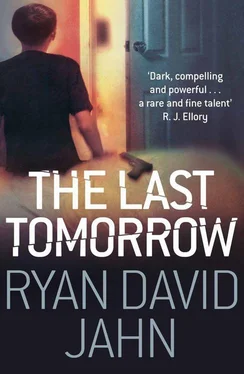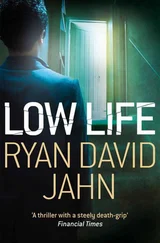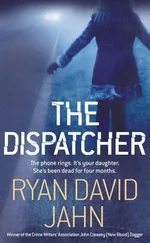Ryan Jahn - The Last Tomorrow
Здесь есть возможность читать онлайн «Ryan Jahn - The Last Tomorrow» весь текст электронной книги совершенно бесплатно (целиком полную версию без сокращений). В некоторых случаях можно слушать аудио, скачать через торрент в формате fb2 и присутствует краткое содержание. Год выпуска: 2012, ISBN: 2012, Издательство: Macmillan Publishers UK, Жанр: Триллер, на английском языке. Описание произведения, (предисловие) а так же отзывы посетителей доступны на портале библиотеки ЛибКат.
- Название:The Last Tomorrow
- Автор:
- Издательство:Macmillan Publishers UK
- Жанр:
- Год:2012
- ISBN:9780230766501
- Рейтинг книги:4 / 5. Голосов: 1
-
Избранное:Добавить в избранное
- Отзывы:
-
Ваша оценка:
- 80
- 1
- 2
- 3
- 4
- 5
The Last Tomorrow: краткое содержание, описание и аннотация
Предлагаем к чтению аннотацию, описание, краткое содержание или предисловие (зависит от того, что написал сам автор книги «The Last Tomorrow»). Если вы не нашли необходимую информацию о книге — напишите в комментариях, мы постараемся отыскать её.
The Last Tomorrow — читать онлайн бесплатно полную книгу (весь текст) целиком
Ниже представлен текст книги, разбитый по страницам. Система сохранения места последней прочитанной страницы, позволяет с удобством читать онлайн бесплатно книгу «The Last Tomorrow», без необходимости каждый раз заново искать на чём Вы остановились. Поставьте закладку, и сможете в любой момент перейти на страницу, на которой закончили чтение.
Интервал:
Закладка:
He hated what was happening but didn’t know how to stop it. Some part of him, some self-protecting instinct, simply went about walling off his heart, and his love, despite his wishes.
He remembered when they were dating, how being near her had caused his heart rate to increase. He remembered marrying her, how slipping that ring on her finger had been like walking through a strange door ten thousand miles from anywhere you’ve been before — a strange door standing alone in the middle of the Arctic, say — and finding yourself, once on the other side, miraculously, at home. He remembered the way her laugh could make him fall in love with her all over again. He remembered all this, but each day these things were more distant than the day before. He became more and more removed from the emotions attached to these memories until they could play in his mind and he would feel nothing. It was like the memories were not his own. They were simply stories he’d heard.
That was bad, but worse was looking at her and being unable to feel anything. He would stare into her eyes, search them, trying to reach the love he’d once felt, but could not. She hadn’t changed, everything he loved about her was still there, as was his love, but that wall was built, separating him from this woman he was probably going to lose, and soon.
In early December, four months ago now, he did.
They said good night, I love you, and shut off the lights. She swallowed her pain pill in the dark, and they lay together without speaking. He must have known it was coming, for he listened to the sound of her labored breathing for hours before drifting into sleep himself. By the time the sun came up on the next morning she was gone. He didn’t cry. It simply wouldn’t come.
The emotion was in there somewhere, he knew it was, but it was walled in.
He moved out of the house the next day, packed a few things and left. He still pays the mortgage, but the house sits empty and locked. He can’t bear to go back. He’s afraid something there — a photograph, a piece of clothing, a scent — might break the wall around his heart, and now that she’s gone, gone and unrecoverable, he doesn’t want it broken. He doesn’t want to feel the loss.
He doesn’t want to feel anything.
When Carl told the boy’s mother they were going to have to arrest her son, her face contorted with agony and she called him a bastard and a motherfucker and a son of a bitch, and beat on his chest and shoulders with her fists. He let her. He simply stood there placid. He let her and he said he was sorry and he said he understood what she was going through and gave her the number at the boarding house and said she should call if she needed someone to talk to, and she said she’d never call him, never call one of the sons of bitches who took her boy away from her, you heartless motherfucker.
He doesn’t want to feel anything.
3
He takes off his fedora and wipes his sweaty forehead. The sweat feels greasy. His stomach is sour. He doesn’t know how he’s going to make it through the day. He might have to visit his connection in the hop squad, pick up a one-dose bindle, something to get him through. It’s become almost impossible to make it clean.
Friedman pushes his way out of the diner and walks to the car. He pulls open the door and slides into his seat.
Carl puts the Ford into gear, pulls it out into the street.
4
Carl walks across the squad room to his desk. He feels much better than he did fifteen minutes ago; he feels nothing at all. He managed to get hold of his connection in the hop squad, pulled him out of bed cursing and met with him beneath the palm trees in the park just south of City Hall. Then he headed back inside and found an empty room, a janitor’s closet, locked himself in, and sat alone with a lighter, a piece of tin foil, and a pen casing. After a couple hits he nodded off, tears streaming down his face. When he came back to reality he picked himself up and dragged himself to a restroom, washed his face of sweat, and dried off with a few paper towels.
He’s a new man.
He sits at his desk. It’s quiet at this hour, the room almost lifeless. His normal shift is eight to four and he’s used to the sounds of talking, shuffling papers, ringing telephones, but he’s glad those things are absent. The silence of the room echoes against the silence within him, and rings out further and further, making him feel part of a vast emptiness that stretches to the outer reaches of the atmosphere and beyond.
It’s perfect.
He thinks of the report he has to type up, looks at his notepad, then at the comic book sitting beside it. The corners are bent and torn. A rip across the front cover has been repaired with tape, yet a rectangle has been clipped from the back, the space undoubtedly once occupied by an irresistible coupon for a Real Sheriff’s Badge or Martian Ray Gun. At the top of the page, between the price in one corner and the publisher’s colophon in the other, these words:
Everybody falls in. .
DOWN CITY
The cover shows a man lying in a gutter with a swastika carved into his forehead. A uniformed policeman stands over him with his gun drawn. Behind this scene, a row of warehouses, simple brick buildings with metal roll-up doors. Skyscrapers jut behind the warehouses crooked and malevolent as fangs. The silhouette of a man can be clearly seen flying from one of the skyscrapers’ windows. Shattered glass hangs around him.
Carl wonders whether he jumped or was pushed. He supposes it doesn’t matter.
Everybody falls in Down City.
He flips the comic open, turns to a story called ‘Little Hitler’, the story the boy said inspired him to carve that star into his stepfather’s forehead, and reads it.
It concerns a man who angrily wanders Down City each night hunting Jewish women. He waits till they’re isolated, then comes up behind them and stabs them. After they’re dead he carves six-pointed stars into their foreheads. He doesn’t want anybody to misunderstand his motives. He might take their money and their jewelry, but they’re dead because they’re Jews.
One night while he’s lurking in the shadows, about to attack, a policeman comes upon him. He runs, but instead of getting away he trips over a curb and falls on his own knife, which, rather improbably, carves a crude swastika into his forehead. Then a truck hauling jars of gefilte fish runs over him as he lies in the street. The policeman stands over him in the last panel, looking down at the mangled corpse, and speaks the final line of the story: ‘What goes around comes around, I guess.’
Carl closes the comic.
The boy carved the wrong kind of star into his stepfather’s forehead. It wouldn’t have mattered even if he’d done it correctly — he tried to frame a comic-book character for the murder, and a dead comic-book character at that — but still, he carved a five-pointed star into his stepfather’s forehead rather than a six-pointed star. Somehow that makes it sadder, more pathetic.
But panic will paralyze your mind. Emotion takes over. You know you have to do something and you do whatever you think of, no matter how strange or stupid, just to keep moving. Doing something is important, not sitting still is important, far more important than any action you end up taking. It seems that way in the midst of panic, anyway. It’s only later, as you look back on the trail of destruction you left behind you, like a tornado that cut its way through a city, that you realize stopping, doing nothing, would have been wiser. You’ve only made things worse.
Plus the kid’s thirteen. Carl has seen grown men do poorer jobs of covering up their own crimes, men in their thirties and forties and fifties.
He looks to the typewriter. He might as well do it. He pulls the machine toward him, grabs three forms and slips two sheets of carbon paper between them, rolls the paper sandwich into his typewriter. After another moment, and an under-the-breath curse, he gets to work, banging hard on the keys to ensure the marks make it through all five sheets of paper.
Читать дальшеИнтервал:
Закладка:
Похожие книги на «The Last Tomorrow»
Представляем Вашему вниманию похожие книги на «The Last Tomorrow» списком для выбора. Мы отобрали схожую по названию и смыслу литературу в надежде предоставить читателям больше вариантов отыскать новые, интересные, ещё непрочитанные произведения.
Обсуждение, отзывы о книге «The Last Tomorrow» и просто собственные мнения читателей. Оставьте ваши комментарии, напишите, что Вы думаете о произведении, его смысле или главных героях. Укажите что конкретно понравилось, а что нет, и почему Вы так считаете.












